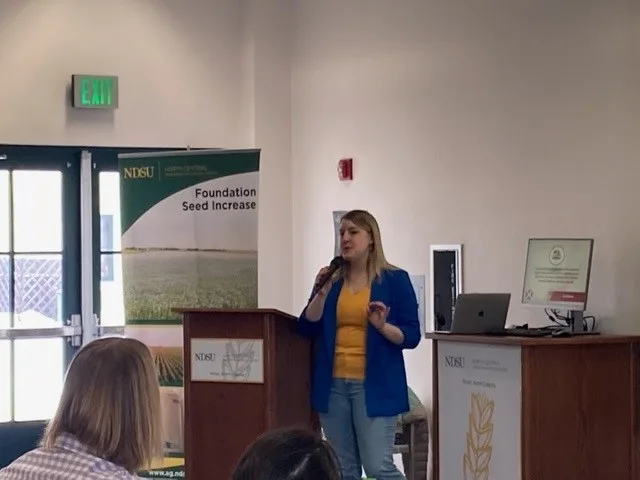

MINOT – Human trafficking is increasingly becoming a topic of discussion, and one event gave an overview of the problem specifically in North Dakota.
Dakota Hope Clinic hosted an event earlier this week discussing the topic at length, featuring a presentation by Sarah Johnston of Bismarck, navigator for the central region of the North Dakota Human Trafficking Task Force.
Johnston said there are two forms of human trafficking that the task force identifies in North Dakota, which can be done on both adults and juveniles: labor trafficking, where individuals perform labor or services through the use of force, fraud, or coercion, and sex trafficking, where individuals perform commercial sex through the use of force, fraud, or coercion. Johnston said labor trafficking is often harder to see.
“It’s harder to recognize because it takes place in the legal realm,” said Johnston. “I know we’ve all probably heard of massage parlors. An advocate was speaking about the Chinese women that get brought into the country and they’re just told, well this is America, this is what happens. When that’s all you’re told, you’re living in that cultural realm.”
The NDHTTF has helped 700 victims since it started recording in 2016, with 71% being adults and 29% minors. Johnston clarified that sometimes the adults started as minors.
“Keep in mind that any data is only what is reported,” Johnston said. “It is not a full picture.”
Eighty-one percent of the NDHTTF numbers are North Dakota residents and 94% are United States residents.
“Oftentimes in North Dakota we see familial trafficking,” said Johnston. “There’s been pastors, law enforcement, and doctors who have been offenders. That’s why trust is very difficult for our clients.”
Though according to the data only a small percent of victims are men, about four percent. Johnston said cases with male victims are not reported as often.
“This data does not accurately represent our state,” said Johnston. “There’s many reasons why. One, there are not a lot of screening options for men. Two, there are not enough services for men.”
Johnston said some of the best ways for the community to help is with housing and transportation for victims, helping with medical and dental expenses, becoming educated, hosting documentaries, welcoming victims into a warm environment, partnering with organizations that fight human trafficking with donations and volunteering, reporting anything suspicious, advocating at the legislature or within one’s occupation or church, and prayer.
“Praying is a huge support,” said Johnston. “If you can’t do anything else, that’s one thing you can do.”
Johnston said there are many organizations that specialize in different ways to fight human trafficking, and she described NDHTTF as bringing them all together with multidisciplinary teams.
“We want to prosecute offenders, but the number one goal is to help survivors,” said Johnston. “Bring services to individuals to create that capacity in the communities, so that you know how to respond. We all have a place in this.”
More information on the North Dakota Human Trafficking Task Force can be found on its website.